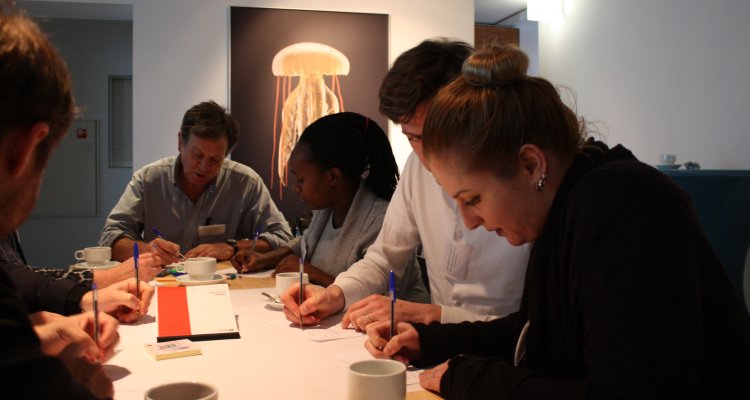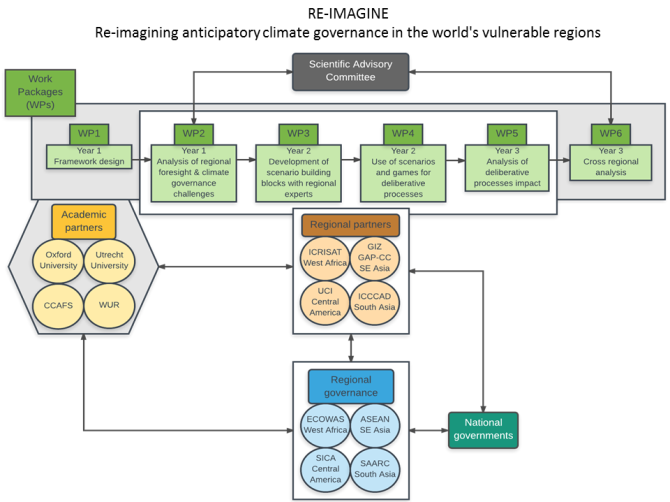
Project
RE-IMAGINE: how to anticipate and govern futures under climate change
Climate change presents new challenges to the world, with impacts unequally distributed and affecting most the poorest people living in the world’s most economically and ecologically vulnerable regions. These is also persisting uncertainty about what diverse climate futures look like. In a period of accelerating earth system transformations and their potentially disruptive societal and distributional consequences, imagining and governing the future comes to the fore as a core challenge for sustainability research and practice. Yet, through what processes and mechanisms are climate futures currently being imagined, and with what implications for present-day climate policy and governance? The recently launched RE-IMAGINE project addresses these timely questions.
- Unfortunately, your cookie settings do not allow videos to be displayed. - check your settings
Read the first RE-IMAGINE newsletter here.
Bridging climate foresight and climate governance research communities
Policy makers, businesses, civil society, community groups and individual citizens are all struggling with how to imagine and steer towards, desired climate futures. Such processes of imagination require, inter alia, scenario planning as one foresight method through which to explore different futures under conditions of uncertainty. Foresight practices and processes include both participatory and qualitative methods, but also trend analyses and climate models. However, such explorations of the future have important implications for the present, given that diverse imagined climate scenarios in the future influence current policy choices and trajectories. If so, what are the political implications in the present of ongoing efforts to imagine diverse futures? What scientific approaches underpin the processes of imagining diverse climate futures? Whose ideas about the future shape actions taken in present? Are climate risks for the poorest and most vulnerable downplayed or ignored in such future imaginings? RE-IMAGINE investigates these questions by bringing together two hitherto quite distinct research communities: the climate foresight and climate governance communities.
Effective modes of climate governance in the face of scientific uncertainty and complexity
Co-led by Assistant Professor Joost Vervoort of Utrecht and Oxford Universities and Associate Professor Aarti Gupta of Wageningen University & Research, the Netherlands, the RE-IMAGINE project investigates how anticipating diverse climate futures is linked to realizing appropriate and effective modes of climate governance in the world’s most vulnerable regions. It analyzes how foresight serves as a decision-making tool in devising current and future climate policies, particularly in vulnerable regions of the global South. In so doing, RE-IMAGINE bridges research on foresight processes that envision climate futures with climate governance research.
The first output of the RE-IMAGINE project is a state of the art critical review of the concept of anticipatory climate governance, from which we derive an analytical framework with which to analyze diverse ongoing practices of climate foresight and scenario building, and their linkages to present day policies. This first project is a detailed review of how the notion of ex-ante or anticipatory climate governance is being understood and deployed by diverse social science research communities working in the sustainability domain. Numerous research communities deploy the notion of anticipatory governance, yet it is understood in very different ways, with diverse ontological, epistemological and normative starting points and research agendas. Most notably, these understandings vary in their conception of the future, including the extent to which the future is knowable and subject to steering, and how the future impacts on the present. We undertake an extensive literature review of how seven research communities understand and engage with concept of anticipatory governance. These include: responsible research and innovation; sociology of science/ sociology of the future; socio-ecological systems; public policy and planning; environmental governance; probabilistic foresight; and socio constructionist foresight. We analyze and compare understandings of anticipatory governance deployed within these seven communities across the following dimensions: (a) how the concept is defined; (b) underlying conceptions of the future (its knowability and manageability); (c) mechanisms and tools seen as key to knowing and steering the future; (d) actors seen as relevant; and (e) how conceptions of the future are understood to impact policy and governance choices in the present. Based on this comparative analysis, we identify overlaps, incompatibilities and complementarities between these diverse perspectives. Insights from this comparative analysis allow us to generate an analytical framework, which is being deployed in subsequent phases of the project to compare the core characteristics, functioning and impacts of anticipatory climate governance practices in diverse contexts, including in the global South.
The RE-IMAGINE project builds on climate foresight expertise of the CGIAR Scenarios Project under the Climate Change, Agriculture and Food Security (CCAFS) Programme, global climate policy and governance expertise from Wageningen University & Research and the University of Oxford, and foresight and climate governance expertise within Utrecht University. It also works with regional governmental organisations in four global regions that are highly vulnerable to climate change: Central America, West Africa, South Asia and Southeast Asia. The project analyses in detail the challenges and opportunities inherent in current ways of anticipating and planning for climate change, to facilitate better policy interventions, particularly in these vulnerable regions. In undertaking this work, the project will collaborate closely with the CCAFS network and regional partners UCI, ICRISAT, GIZ and ICCCAD to design and test new anticipatory climate governance processes in practice. The results from these regional processes come together in a cross regional analysis. A Scientific Advisory Committee consisting of leading foresight and governance researchers provides advice throughout the project. RE-IMAGINE has been made possible by the BNP Paribas Foundation’s Climate Action Call, which aims to strengthen anticipation of climate change processes, and further our understanding of impacts on our environment and local populations around the world.

Publication:
Vervoort, J. & Gupta, A., 2018. Anticipating climate futures in a 1.5 °C era: the link between foresight and governance, Current Opinion in Environmental Sustainability, 31, 104-111. Available here.
Outreach activities:
The RE-IMAGINE project was launched on 23 January 2018, with a launch event held at the Utrecht University Museum. The event was attended by over 50 people from across the Netherlands, Europe and internationally. Please read more about the event on this blog.
Additional activities:
- The RE-IMAGINE team gave a lunchtime lecture on foresight and scenarios in policymaking and planning and how this is related to RE-IMAGINE at BNP Paribas in Amsterdam as part of their Sustainability Week. The event was attended by staff from a variety of departments, as well as some management with experience with scenarios.
- The RE-IMAGINE team took part in a discussion at BNP Paribas in London on 5 June 2018. The discussion focused on how the anticipation of future climate change scenarios influences present day policy, and what the role of the private sector could be in helping to deal with the impacts of climate change. Please find a video of the discussion here.
- The RE-IMAGINE team gave presentations at the Foresight4Food International Workshop, which took place from 18th until 22nd May in Montpellier, France.
- The RE-IMAGINE team, together with CCAFS partners, gave a presentation about the CCAFS Scenarios Project and RE-IMAGINE to the CGIAR's strategic foresight meeting in Aberdeen on 9 May 2018.